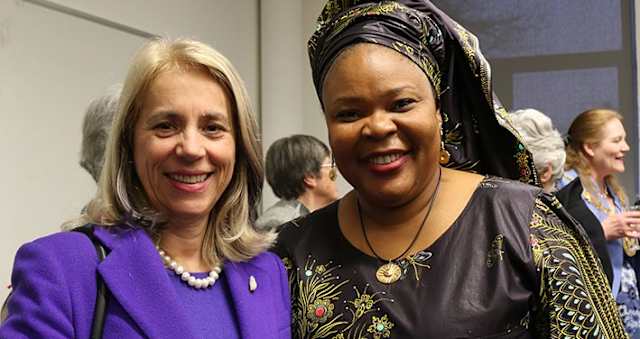
Last weekend at the University of Winchester, she worked with young people from across the UK attending the Peacejam conference to learn about building peaceful societies and she also presented a public lecture.
Here, she tells us about finding courage, the person who has most inspired and influenced her and why young people are crucial to building a better world in the future.
How did you first find the courage to become a peace activist?
My grandmother raised me and my sisters to be community aware and I was brought up to believe that people of different race, colour and creed were all the same. Justice and injustice was also something that we discussed a lot at home and there was always this thing about being bold and standing up for what you believe in. I think one time I just tried to put it into practice although it didn’t come in just one day: there were many days of fear but we never allowed fear to stop us. So I think it was just working through my fear: when it was dark, I stepped forward, and when it was bright, I stepped forward.
I can’t say I’ve mastered courage. We take it one piece at a time - walk towards it and tell yourself: no matter what, you did nothing but your absolute best.
What platform has winning the Nobel Peace Prize brought you?
The Prize is a huge platform, it’s a huge tool for good. I can’t count the number of boards and international associations that I’m involved with now as a result. I have all of these different roles and I’m invited into those spaces and have opportunities to present my work. So the Prize has really been helpful.
But there have also been challenges with winning the Prize because your life becomes an open book. I remember what Desmond Tutu said to me once: “You’re a Nobel Laureate now: be careful what you say because everyone will quote you.” So not only is it fantastic and people recognise you and your work, but you have to check everything that comes out of your mouth.
Why do you think events like Peacejam are important in highlighting human rights to young people?
I think in our world today, everyone needs to recognise that the adults cannot do it on their own, that there is a need for serious intergenerational mentorship and for key spaces that really help to mentor young people.
The second thing is that young people are very aware of what’s happening in the world. When I was growing up I wasn’t as enlightened about politics. My seven-year-old daughter follows the news and asks questions and with that kind of increased awareness and increased curiosity, there has to be some guidance to steer young people in the right direction. Peacejam is one of those spaces that really is effective.
Finally, if we do not create spaces for good, others will create spaces for bad and then young people may fall prey to it. When I won the Prize, I was asked a question about legacy what my legacy would be. I answered that I wanted a legacy of my life to be having engaged and encountered a lot of young people. Peacejam is also a space which provides me an opportunity to learn from young people, as they learn from me.
Who were the people who influenced and inspired you growing up?
My grandmother who is now over one hundred years old. She was always interested in we five sisters being economically empowered. She was constantly giving us a dollar or five dollars to see what we would do with it – not to buy things with but to invest. My grandmother has been married three times and the way I see it from my feminist perspective is that she was a feminist in the days when people were maybe too afraid to identify with feminism.
She was fifteen when she was married for the first time and when her husband physically abused her she left him. Even today, she is a business woman who manages her own finances and still collects her rent from her property. She ran her own business, she stood up against violence, she took care of herself. When we were young she used to say: “If your husband brings rice to the table, you’ll have to bring charcoal.” She brought us up to believe in a life of interdependence and independence, not dependence.
What advice would you give the young people attending Peacejam this weekend about how they can create a better world?
Find that one thing that you’re passionate about. Find that one thing that keeps you awake at night. Find out that one thing that you have a lot of ideas about tackling. If that one thing is the thing that tugs at your heart, that you have tons of ideas about, that is the thing that you have been called to do. So if it’s a human trafficking issue, go for it because that is what you are going to do to change the world. Each of us needs to find our passion and chip away at the problems in the world, one bit at a time.
Back to media centre